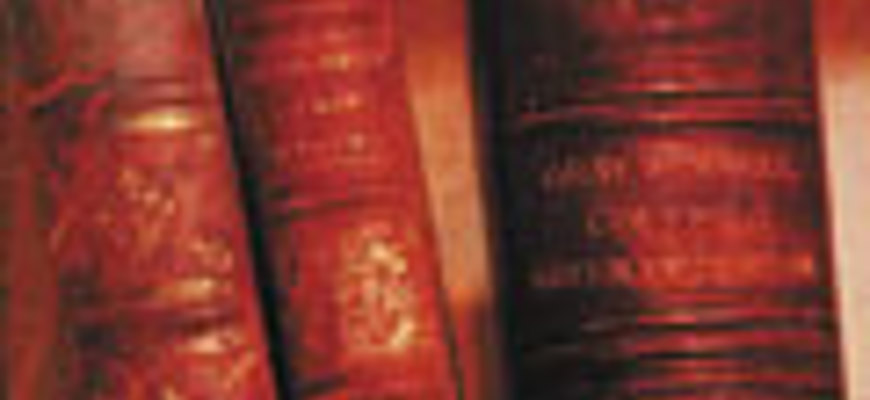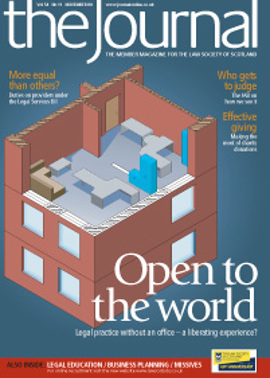Book reviews

Licensing (Scotland) Act 2005: 2nd edition
The second part of that injunction causes no problems whatever. There is seldom much to criticise about Jack Cummins in full flow. However, the first part of the instruction provided food for thought. How can less experienced lawyers get into this field? For years we had licensing board meetings in our diaries every quarter or so. October followed June as surely (and, it seemed, as quickly) as night followed day. There was plenty of non-controversial stuff to cut your teeth on, a chance to see some big boys and girls in action, and an opportunity to gain experience over time. The end of the transition period has almost seen an end to the frantic round of weekly meetings with processes and procedures being refined on the hoof. Board meetings will be fewer and further between. How will people now break into this field of law?
The fact is that an annotated Act cannot be a textbook, and this book does not pretend to be such. To use such a volume to best effect does require a basic knowledge of the Act, and an idea of where to look for help in a new regime correctly described by the author in the preface to the second edition as “inordinately complex”.
As to the merits of this work, there can be no doubt. Written in Jack Cummins’ usual concise style, it focuses on the main issues. A much fatter work than its predecessor, it incorporates seven sets of regulations and tries to anticipate the changes likely to be introduced later in 2009. The intellectual analysis is up to his usual standard. I particularly like the consideration of sched 3, para 2, exploring the question of duty to trade. The phrase “‘only’ is a word of limitation, not compulsion”, as elegant as it is succinct, goes directly to the heart of the matter. The arguments of those who maintain that there is a duty to trade are gently deconstructed and their logical absurdity laid bare. There is now a little case law, and a great deal of commentary. References are made to these where appropriate.
The short but helpful introduction highlights some of the key differences between this Act and its predecessor, touching on such issues as sale to trade, exempt premises, clubs, and the woefully inadequate provisions surrounding provisional premises licences. There is a useful table summarising some of the more esoteric issues such as licensing of vehicles.
The difficulty for the practitioner, especially the less experienced one, lies in the patchwork nature of interpretation and practice. Anyone who advises the licensed trade does so at his peril if he merely dabbles. Rules about hours are as regional as ever. Regulations regarding children are even more diverse, with the cause of child friendly tourism having been set back half a century in some parts of the country. No book, not even one of this high standard, can deal with that. What it can do, and where it succeeds, is in providing a fingertip guide for all licensing practitioners. A worthy successor to, and more intellectually robust than, the Allan and Chapman guides to the previous legislation, this book will be a well thumbed part of every licensing lawyer’s library.
Wylie Encyclopaedia of Forensic Science
There is no subject that is not considered, and many areas are considered in a number of ways: there are 11 papers on DNA alone, from a straightforward explanation, through mitochondrial DNA (both interpretation and profiling), to low copy number (or touch DNA: criticised in The Queen v Hoey [2007] NICC 49), to the interpretation of mixture DNA. Every conceivable analysis is considered: handwriting, fibres, footwear, fingerprint, ear print, drug; and the science easily and straightforwardly explained. The range of papers is diverse, including report writing, hearsay evidence, elder abuse, the elderly in court, and drug impaired driving, where the authors usefully describe the effects of the various drugs before considering the method of detection and analysis.
The quality of the papers is clear, well written and approachable although on some legal aspects, such as expert witnesses, the slimmest of information is provided. This is a hugely valuable and worthwhile contribution to any civil or criminal practitioner’s library.
Crime Scene Management – Scene Specific Methods
The management of the scenes in this case gave the defence a significant point of attack and was subjected to near microscopic scrutiny.
How to do it properly is the scope of Crime Scene Management. The duties of the first officer attending the scene, the role of the crime scene officer, and police photography are considered, as are evidence gathering techniques. There are chapters on fingerprints, DNA, blood pattern analysis and physical evidence, and the preparation of reports and statements.
This is a very good basic introductory book which is well written, practical, readable and reliable, and would be valuable to the practitioner because its limited content focuses on areas regularly dealt with in the courts. It would be of significant interest to all who deal with criminal cases. For the court practitioner the chapter on blood pattern analysis, in particular, would permit of the much better leading of witnesses on the subject, and the laying of the ground for it, as well as for cross examination.
Mason’s Forensic Medicine for Lawyers: 5th edition
The book opens with a straightforward introduction to anatomy and physiology, essential to enable a fuller understanding of the mechanisms of death. It considers all manner of injury: firearms, explosives, fire, road traffic accidents and assaults, as well as the sciences such as toxicology. Sudden natural death is well discussed. All aspects of medico-legal issues are covered, including industrial disease, public health, medico-legal aspects of marriage, sport, and medical practice. More could have been considered from a Scottish perspective of forensic mental health, especially some discussion of the procedure for examination of facts and the role of the forensic psychiatrist in that procedure: Stewart v HMA (No1) 1997 JC 183. The text is very well referenced. This is an immensely valuable and relevant core text.
David J Dickson
Clinical Forensic Medicine: 3rd edition
(Ed) W D S McLay
PUBLISHER: CAMBRIDGE UNIVERSITY PRESS
ISBN: 0 521 70568 4
PRICE: £40
This introductory text ranges over the legal system in Scotland through to the role of the medical practitioner, to medicine as it relates to those in custody, to scene of crime management, forensic science and the investigation of sexual and physical abuse.
The chapters on child physical and sexual abuse and that on the investigation of the sexual abuse of adults are detailed, considering the examination, storing of samples, recording of evidence and the clinician’s duties of aftercare.
The chapter on injury, while brief, provides the basic information necessary to understand the nature of injuries caused by various weapons from knives to rifles and their relative medical descriptions.
The chapter on mental illness and psychological conditions is particularly helpful in providing an overview of Scottish mental health legislation within the forensic medicine setting, providing brief paragraphs outlining the main legislative provisions mainly from the perspective of compulsory detention for assessment.
Suggestions for future books
The Book Review Editor is David J Dickson. Books for review should be sent c/o The Law Society of Scotland, 26 Drumsheugh Gardens, Edinburgh EH3 7YR
In this issue
- The equality, diversity and discrimination agenda: change and challenge ahead
- Justice on the green front
- Let the light in
- Needs of the family
- Reality on the West Bank
- Outside of the box
- Effective philanthropy
- Case for the defence
- Taking on the system
- Same rules for all?
- The benchmark
- Law reform update
- From the Brussels Office
- Appreciation: David Hector MacNeill
- Halfway to the Big Bang
- The same but different
- Five steps forward
- Ask Ash
- Preparing for disaster
- Rules a-changing
- Fair competition
- Time on whose side?
- 40 days and 40 nights
- Hear the grown-ups
- Problems of transition
- Scottish Solicitors' Discipline Tribunal
- Website review
- Book reviews
- Life on the other side
- Never waste a good crisis






